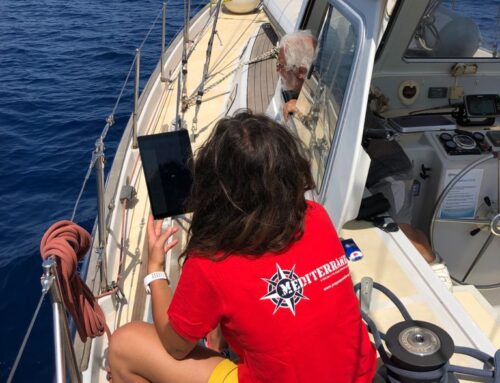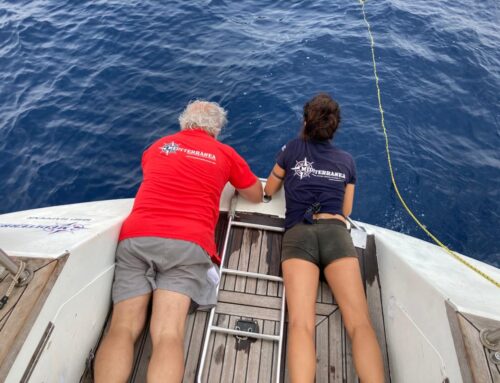
(di Simone Perotti)
“Narrow-mindedness and double identity are the two main topics running through contemporary modern Greek literature, in particular in most recent times”.
Maurizio De Rosa looks like an intellectual of the old days, cultured and learned as well as sensitive and perspicacious, actual witness of contemporary Greece.
He brings Pessoa and Vittorini to my mind while I’m listening to him sitting in the cockpit of Mediterranea, a boat that sailed to Athens to host thought.
“Greece developed more like Israel than Italy”, De Rosa said, “because Greek culture, language and society were widespread over the former Eastern Roman Empire, from Constantinople to Alexandria, from the ancient culture of the Cycladic world to Asia Minor, to Magna Graecia, throughout the Mediterranean. Then, all of a sudden, Greek culture was relegated to a cramped region which is today’s Greece. This might be a reason for the recurring element in Greek literature of a room, a well, a dam, a wall, any kind of closure. Just think of “the Walls” by Kavafis. Greek often suffocates”.
“Double identity is also recurring in Greek literature. A double nature between the Eastern and the Western world, for example. Janissaries were the Ottoman Sultan’s troops and bodyguards, yet they were converted Greeks, who often had to fight against their uprising fellow countrymen. A Greek paintress from Hydra, in the time of Laskarina Bouboulina, cross-dressed to enter the Art Academy in Rome. She was Greek but of Albanian origins, thus a woman who pretended to be a man and an Albanian who lived as a Greek. And think of Markaris: he was born Turkish, is Greek for language, and German-speaking for his studies.”
While listening to Maurizio De Rosa I think of collaborationists under the Regime of the Colonels, who were Greeks against Greeks. De Rosa is highly evocative, he roams freely, typically Italian and even more Greek now. Is this free roaming of thought a typical feature of the Mediterranean we are searching for?
And what about the sea? “The sea is always there, in the background, in the shape of ships and captains over the blue reaches of our planet. Here everyone has had a relative shipping. Just think of “Le Catene del Mare” by Ioanna Karistiani. The sea exists, though there is a branch of Greek culture (in the North, between Thrace and Macedonia) that does not look at the sea, rather it has always followed a metaphysical and existential line of thought, from Angelopoulos to Kavafis. There the city, the man in his inner being, the inland prevail.”
De Rosa loves talking, the sun grazed his face, in Zea Marina the heat of the day gave way to the evening.
“Greek intellectuals have always had to make political choices, starting from the primordial decision on the language to be used. In Greece two languages developed in parallel, a cultured one and a vulgar one. The dilemma was sorted out quite late, with a language that is a hybrid between the two, today’s modern Greek. Earlier, conservatism and progressivism developed in parallel on the language field even before than on contents. Then the Metaxa dictatorship, followed by the Regime of the Colonels, up to 1974 drove Greek writers to choose among segregation, exile, participation, orthodoxy. Later, calm and stillness prevailed, in some sort of necessary and inevitable detoxification from weightiness and commitment in political issues. In the last decades, though an existential vein has always characterized Greek literature, writers distanced themselves from public commitment, which was no longer pressing in a democratic era, that tried to leave behind bad memories of dictatorship, collaborationism, lack of freedom. Today’s “crisis” requires a new participation at social level, and Greek intellectuals were as if caught by surprise, they were unprepared.”
De Rosa and I talked about politics, young people, street rising. “I perceived a strong will to go down the streets and see what happened, a light form of actual participation. I am not denying strong motivation, but they belonged to a minority. For the majority it was more curiosity and a superficial motivation.”
We greeted with pleasure. A Socratic dialogue, with no schedule, no timing, no targets. This is probably the reason why we were sincerely grateful to each other.





Leave A Comment